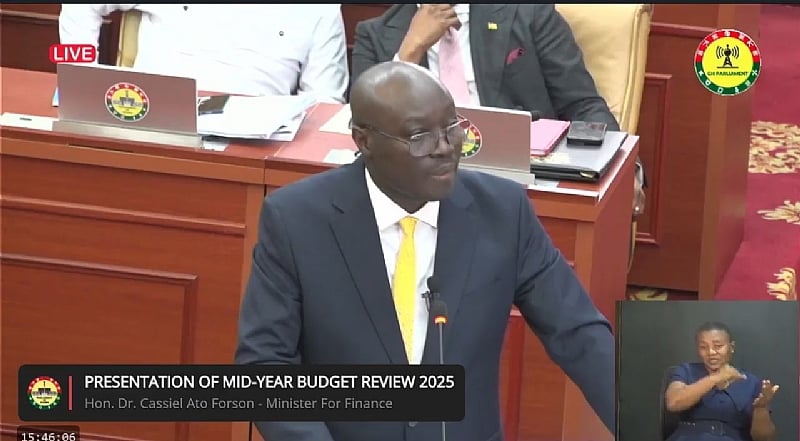Paragraph 1: Economic Distress and Inheritance
Ghana’s 2025 Mid-Year Fiscal Policy Review reveals a nation grappling with the aftermath of severe economic mismanagement. The Akufo-Addo/Bawumia administration left behind a legacy of staggering fiscal imbalances, ballooning debt, weakened institutions, and eroded public trust. Key sectors like cocoa and energy were crippled by debt, while state-owned enterprises faced paralyzed balance sheets. High inflation and a depreciating cedi ravaged household incomes and savings. The Domestic Debt Exchange Programme (DDEP) inflicted painful haircuts on pensioners and the middle class, further exacerbating the economic hardship. Eurobond holders also suffered losses, impacting Ghanaian individuals and financial institutions. Corruption was rampant, investor confidence plummeted, and unemployment soared.
Paragraph 2: The Mahama Administration’s Response and Early Successes
President John Dramani Mahama, upon re-election, inherited this economic quagmire. His administration opted not for excuses, but for action, embarking on a path of structural reforms and transformation. The government prioritized fiscal discipline, revamped social investments, and established the Ghana Gold Board to bolster the cedi’s stability. Crucially, coordination between the Ministry of Finance and the Bank of Ghana was restored. Within 200 days, the Mahama administration achieved remarkable progress. Fiscal deficits were reduced, inflation fell drastically, interest rates declined, and gross international reserves improved significantly. The cedi experienced a historic appreciation against major currencies, reversing previous years’ depreciation. These early successes signaled a restored economic direction and renewed hope.
Paragraph 3: Macroeconomic Performance and Policy Implementation
The first half of 2025 showcased robust economic growth, driven by strong performance in the agriculture and services sectors. Inflationary pressures eased considerably, with both consumer and producer price inflation declining sharply. Interest rates on treasury bills fell significantly, signaling improved market conditions. The cedi’s remarkable appreciation, the strongest in its 60-year history, reflects improved macroeconomic fundamentals and renewed investor confidence. The external sector also strengthened, with a notable increase in gross international reserves and a substantial improvement in the trade balance. The successful recapitalization of the National Investment Bank (NIB) demonstrates the government’s commitment to stabilizing the financial sector.
Paragraph 4: Fiscal Measures, Debt Management, and IMF Program
The government’s commitment to fiscal discipline yielded positive results, with deficits falling below targets and a primary surplus exceeding expectations. Revenue collection performed robustly, while expenditures were contained. The administration actively pursued debt restructuring, securing approval for indicative terms from Parliament and beginning negotiations with bilateral creditors. Progress was also made on commercial debt restructuring, including the payment of debt service to Eurobond holders. The IMF program is back on track, with successful reviews and disbursements contributing to Ghana’s economic recovery.
Paragraph 5: Addressing Challenges and Key Initiatives
The government acknowledges challenges remain, including customs revenue shortfalls, fuel smuggling, wage pressures, and the use of foreign currencies in contracts. Measures are being implemented to address these issues, including the use of AI tools in customs operations, withdrawal of tax exemptions on marine gas oil, payroll audits, and a directive to denominate all government contracts in cedis. Key initiatives like the Ghana Gold Board (GOLDBOD) have demonstrated success in boosting gold exports and strengthening reserves. The 24-Hour Economy and Accelerated Export Development Programme, anchored by the Volta Economic Corridor, aims to transform the Ghanaian economy.
Paragraph 6: Outlook and Commitment to the Ghanaian People
The Mid-Year Review paints a picture of a nation on the path to recovery, albeit with continued challenges. The government emphasizes its commitment to transparency, accountability, and the well-being of all Ghanaians. The appreciation of the cedi and declining prices offer relief to households and businesses. However, the government urges businesses to adjust prices downward to reflect the improved economic conditions. Looking ahead, the administration projects sustained economic growth, further declines in inflation, and continued stability of the cedi. The government emphasizes its dedication to creating jobs, restoring confidence, and positioning Ghana for a brighter future. The message is clear: Ghana is rising again, and with continued unity and hard work, the best is yet to come.


